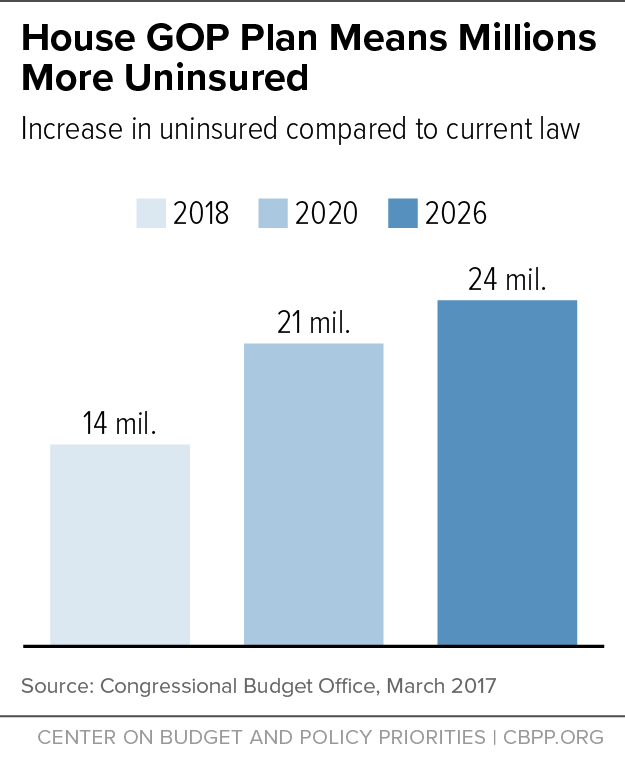BEYOND THE NUMBERS
The House Republican health plan to repeal much of the Affordable Care Act (ACA) and radically restructure Medicaid would cause 24 million people to lose coverage by 2026 and drive $880 billion in federal Medicaid cuts over the next ten years, the Congressional Budget Office (CBO) estimated today. This means the plan would eventually reverse all of the nation’s expected historic coverage gains under the ACA.
The plan, which two House committees approved last week, would effectively end the ACA’s Medicaid expansion starting in 2020 and convert all of Medicaid to a per capita cap. It would also repeal the ACA’s marketplace tax credits and subsidies, substituting a highly inadequate tax credit in 2020, and immediately end the ACA’s individual and employer mandates to buy and provide health coverage, respectively.
While the plan would retain most of the ACA’s market reforms and consumer protections, including protections for people with pre-existing conditions, it would newly permit individual-market insurers to charge 30 percent higher premiums to people who haven’t maintained continuous coverage. (That provision is a deeply flawed, ineffective alternative to the individual mandate.) Insurers could also charge premiums as much as five times higher for older people than younger people.
Among CBO’s key findings:
- In 2018, the number of uninsured would rise by 14 million, relative to current law. That number would further rise to 21 million by 2020. By 2026, the number of uninsured would increase by 24 million — or 86 percent higher than under current law. This means that, by 2026, all of the historic coverage gains expected under the ACA would disappear and the uninsured rate among the non-elderly would be at or above its 2010 level.
- Federal Medicaid spending would be cut by $880 billion or 17.6 percent over the next ten years, relative to current law, due to the reduction in federal funding for the Medicaid expansion and conversion of Medicaid to a per capita cap. By 2026, the annual cut in federal spending would rise to $155 billion, a reduction of 24.8 percent, relative to current law. As a result, the number of Medicaid beneficiaries would fall by 14 million in 2026. Most of those losing Medicaid would likely end up uninsured.
CBO’s estimate of a 24 million increase in the number of uninsured under the House bill is only 8 million lower than CBO’s 32 million estimate of the ACA repeal bill that President Obama vetoed in January 2016. That bill would have entirely repealed the Medicaid expansion and marketplace credits and subsidies after two years, immediately repealed the individual and employer mandates, and caused the virtual collapse of the individual market.
At the time, congressional Republican leaders dismissed the 32 million estimate because it didn’t account for their “replacement” coverage provisions, which they hadn’t yet agreed upon. But since the new House plan effectively ends much of the Medicaid expansion over time, adds a radical Medicaid per capita cap that would shift significant costs and risks to states, and provides only a highly inadequate tax credit, CBO estimates that this “replacement” bill would offset only 25 percent of the coverage loss expected under the earlier repeal bill — which would have left millions more uninsured than before the Affordable Care Act.

